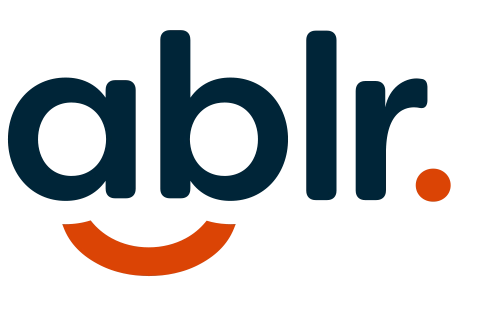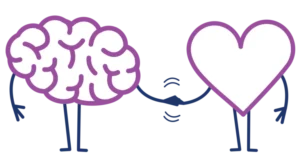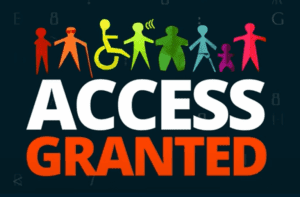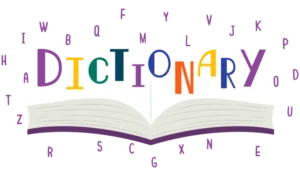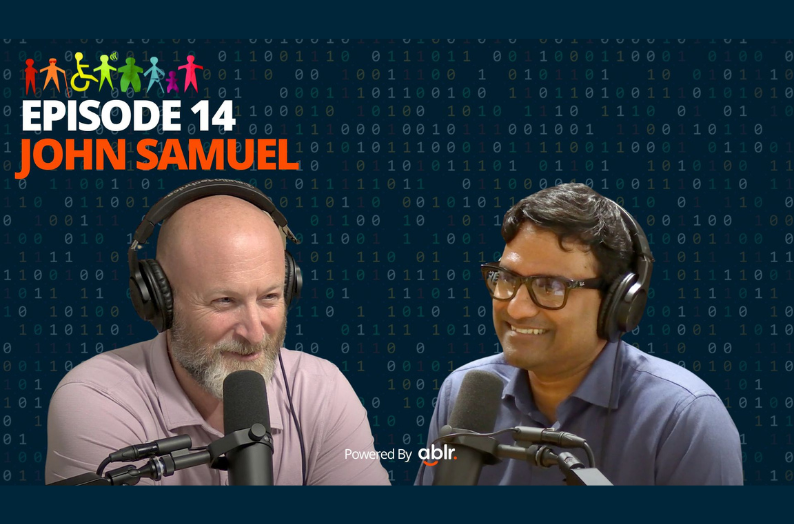Access Granted: John Samuel Part 1 Transcript. Tune in wherever you listen to podcasts.
Mike Iannelli: Welcome to Access Granted, the podcast powered by Ablr, a full service disability inclusion organization. I’m your host, Mike Iannelli, and today we have a truly special episode. I’m joined by John Samuel, my co founder and CEO of Ablr. John’s vision is the driving force behind this podcast, and we’re excited to share the story of how Ablr came to life.
From our journey together to the challenges we’ve faced in building an inclusive business. I’m so honored to have John Samuel here today to share his story and can’t wait for you to meet my partner and dearest friend.
I got to tell you, I got a special guest today. I’m pretty excited about this. John, well, we’ll call him Johnny Sams. John Samuel, the co-founder, my co-founder, my partner, and our CEO of Ablr is joining us today, which is an incredible day because John and I haven’t really had an opportunity to talk much truthfully over the last four years. John, thanks for being here, my friend. And I’m honored to be here on this journey with you, buddy.
John Samuel: No, I’m so thankful to be here and I love you so much. And this is so, so exciting. Cause I love hearing your voice, talking to our customers [00:01:00] and, and really kind of getting your own perspective, which is really exciting.
Mike Iannelli: I was overwhelmed with like all the things. And I was like, what do I ask John? Do we talk about Ablr? And I will tell you this. I’m going to give Kim Casey, our director of accessibility, and I believe our heartbeat of our company, we were talking this morning and I was like, what, what should I talk about? There’s so many things. There’s the book, there’s the Ted Talk. There’s this whole journey that you’ve been dealing with your entire life with retinitis pigmentosa and how you found out about it and then your whole life and hiding it and all those things I want to talk about. And then there’s the Ablr story. But here’s the one thing I want to start with is, a lot of people don’t know, but you know, Ablr wasn’t always Ablr. And Ablr started off as something different.
And it was a journey that you started. And I want to see if you talk a little bit about the old school days of LCI Tech and the struggles. Because we’re here today on a podcast talking about this stuff. And we’ve got GAAD coming next week, and we’ve got 150 people showing up and supporting this journey that we’re on.
This movement is becoming just a blessing, but it wasn’t always [00:02:00] that way. And your journey getting, getting to the place, I’d like to share that. So talk to us a little bit about that journey with LCI Tech, how you got there. What was your vision? What was some of the struggles you were dealing with?
John Samuel: Yeah, for sure. You know, when I first came to LCI, I was tasked with one thing: create a business that would create upward mobility for people who are blind in tech. And it, you know, it’s a very broad thing to do. Like, what do you do? How do you create upward mobility for people who are blind? And so I was even challenging, like going through my own challenge of losing my sight, accepting it. So I was going through that challenge myself. So I was like, what are the things I’m going through? What are the challenges I was facing to find my own job? And so when I started thinking about that, I realized that the first thing I struggled with was accessibility. I couldn’t even apply for jobs online.
And so when I was losing my sight, trying to apply to jobs, I’d have to ask my wife, Nicole. Nicole, can you please fill out this application for me? [00:03:00] At the time, we were just, you know, brought in our first baby, Eli, who was just months old.
Mike Iannelli: I love this guy.
John Samuel: Just a sweet little guy, and Nicole was nursing and going to work full time. And that’s the thing you don’t want to do. It’s like, “hey baby, can you please fill out this application for me?” And as we know, when you’re applying for jobs, you need to apply to tons of jobs. You can’t just be applying to one at a time, and that’s what I struggled with. So I was like, well let’s figure out a way if we can address this digital accessibility barrier, that’ll help get people into jobs.
And so that’s something that people who are blind can actually bring to the table, is native screen reader user testing. And so we started that way. And so we started doing testing and we were getting $50 invoices. It was really like, struggling right? Cause I didn’t know how to value this.
I didn’t know what value are we bringing? For me at the time was like, well this is something we can do. And if we can get some money, that’s better than nothing. And so I started to learn about [00:04:00] marketing, digital marketing firms and seeing the work that they did and how they had clients. So I was like, well this is perfect.
If we can start partnering with a digital marketing firm, they have the clients. We have the accessibility services. I don’t have to do the selling. Cause that’s something I struggled with because all I wanted to do is raise awareness for disability inclusion, why we need to be doing this. And so how can we get companies who need the service, our services.
And so that’s really what kind of drove me down going to digital marketing firms, and that led to connecting with Walk West, which brought me to you.
Mike Iannelli: Yeah, what a journey. What a journey man. I kind of probably tell people every day, I still remember. I don’t know if you remember the first time we met, but, it was a rough day for me getting out of bed. But when I showed up, this smiling Johnny Sams shows up and I’m like, oh goodness. I remember walking down the hallway and we were talking about earlier with Jeb, but that tour was just incredible.
Just talk to me a little about the tour. Cause a lot of folks don’t know [00:05:00] the story of LCI and what LCI does. There’s lots of reasons why it’s important, but the main reason why in this case it’s important, is because you and I came together at LCI. I tell people all the time, I think the Ablr story is divine and I do, I really, really do.
And so talk to me about the tour.
John Samuel: Yeah. So I think taking a step back, how I found LCI was I was living up in D. C. at the time, and I was working for an investment firm. And that company folded and I was out of a job. And as I mentioned, Nicole and I had just welcomed Eli and we were living up there.
I had no job. We just had a baby. We just had built a house in D. C. and it was struggling. I was struggling personally. I was going through a really hard time because of my sight loss, just not being able to have that confidence to say that I can have another job. And so that’s when I heard about this software that was developed at SAS. That was designed by a gentleman named Ed Summers who had retinitis pigmentosa as well and lived in Cary, North Carolina.
And up until that point I had never met another blind person. And this software that Ed had created was designed to help people who are blind and low vision visualize graphs and charts using sounds. And I thought it was the coolest thing. And so I tried to get in touch with Ed for two, three months, no luck.
And then finally, Nicole’s like, well if he can live in Cary maybe we can too. So we found a house online, told my folks, they got so excited. And my dad immediately jumped in the car. He never thought I was coming home. And he started driving and he’s driving down the road and talking to us on the Bluetooth and starts yelling at something.
Like, what are you doing dad? And he’s like, Oh there’s a blind guy in the road, maybe it’s the guy you’re trying to get in touch with. Dad, please don’t yell at blind people on the road. Don’t yell at anyone on the road. And he’s like, alright. Gets out of the car, walks up to this poor guy and says, “are you Ed Summers?” And the guy goes, “yes, I am.”
And my dad goes, “Oh my son’s trying to reach you.” And puts the phone in the poor guy’s ear. And after apologizing to Ed, he agreed to meet me, came down that next weekend. And I talked about how that 30 minute conversation turned into three hours. And Ed introduced me to the world of [00:07:00] accessibility. And he also showed me that my career wasn’t over. But as I was looking for jobs, Ed was talking about, “you need to be open about your disability. You need to reach out to these companies who have DEI programs, diversity, equity, and inclusion programs.” This is 2017. And so I started doing that and talking openly about my vision loss and not a single one of those companies got back to me.
And I started thinking, I was like, with my education, my experience and my privilege, if I can’t find a job, what about other blind people? And so, cause I just didn’t feel like I checked the box that they wanted to check. And so I started thinking about this and I was like, what can I do to create opportunities for other people?
And typically everywhere I go, I have a pair of sunglasses and
Mike Iannelli: Good shades, by the way.
Thank you. Thank you. And we’re going to get to your other shades here in a minute, but go ahead.
John Samuel: And so, I wanted to make sunglasses. But I had been inspired by this company called Toms Shoes, which is a social enterprise where you buy a pair of shoes and they give a pair of shoes to someone in need.
So I wanted to have sunglasses [00:08:00] made, but I didn’t want to just give a pair to someone who needed them. I wanted to have them made by people who are blind. And so my thought process was if you give someone a job, you give them hope, life, there’s generational impact. And so that’s when Ed introduced me to Jeffrey Hawting, the president of LCI.
And when I was talking to, to Jeffrey, LCI is the largest organization employer of people who are blind in the country. And they’re a manufacturing company. All I wanted to do was learn about manufacturing with folks who are blind. And Jeffrey kept talking about wanting to create upward mobility for people who are blind, and that’s what brought me down to start LCI Tech. And that was kind of the origins of it.
And so, I remember the first time coming into LCI, I was taking a tour with DuWayne Gilbertson, who’s the Chief Revenue Officer of LCI. He was walking me through the manufacturing, and at this time I was starting to lose my sight. I really couldn’t see much in front of me, and I was doing a sighted guide, when you put an elbow out and I’m holding on to DuWayne’s elbow and he’s guiding me through this manufacturing facility. Which is 240,000 square feet [00:09:00] of amazing space.
Mike Iannelli: It’s a great, great place.
John Samuel: 2,000, over 2,000 products being made. And it’s amazing. There’s hundreds of people working there. And I just remember walking through and hearing the collars of the dogs, the canes hitting the sides of the panels and people just working. People working. I could hear the laughter. I could hear the sounds that I never thought possible. I didn’t think people who are blind could have jobs, have successful careers like this.
And it brought me to tears. And as I was walking through that, you talk about those divine interventions. It was divine intervention for me to hear those sounds. And to this day as we’ve launched Ablr, we’ve been successful doing what we do.
You know, every day I feel accountable to those folks, because it’s those people who work in that manufacturing facility who gave us our start. And for that I’ll always be grateful. [00:10:00]
Mike Iannelli: Amen to that, my friend. Yeah, I felt the same way when I went through. And I tell folks all the time the story. But I remember that, specifically remember after the tour and you had the screen reader. And um at the time it was like fast. Like it was, I can hear it now. But at the time I was like, what the heck was that?
John Samuel: Yeah.
Mike Iannelli: And you’re like, oh, that’s my screen reader. It’s how I keep, I remember you saying “it’s how I keep up with business.” Like you, you can see, I can’t. So I have to hear as fast as you can interpret information. So that’s why it’s so fast. And I remember that moment, it was like, it was just such an awakening for me. Because my background, John as, you know, has been in advertising and marketing. I’ve done some fun things. But I built a lot of content, a lot of websites, a lot of mobile apps. And I never, I mean, just wasn’t even discussed. Like ADA?
I didn’t even know. I didn’t really truthfully know what that was. I mean, I knew what it was, but I didn’t know what it was. Accessibility, didn’t know what that was. And so my [00:11:00] whole mindset was very, I’d say selfish. It just wasn’t aware. And that moment when that sound of the screen reader popped, it was just a moment of clarity for me. And truthfully, I felt bad.
I felt like, man I’ve been doing this for 20 some years. How much content did I produce that wasn’t accessible? And that was the moment when I realized, oh goodness. And you and I talk about this all the time. You were in a dark place.
John Samuel: Yep.
Mike Iannelli: I was in a dark place. But that was sort of an awakening for me to say, wow, there’s more to life than what I’m doing.
I was searching for meaning and purpose. And I’ve talked a lot, but that search for purpose, that search for meaning. I just felt incredibly unfulfilled. That screen reader man just changed my life. I met this guy and he’s doing something amazing. I think I can help him. And I want to help him.
And we struggled in the beginning with that too. Cause I remember we created our little algorithm and then we tried to do some things together as [00:12:00] partnerships. And I remember the day it was like, we’re not going to get there unless we build something that people can really attach to, a mission, a purpose, a visual experience of what we’re trying to do.
I just think the story of how Ablr kind of came about was really a beautiful story and all of a sudden it’s like we built something that you were trying to create. But all of a sudden now it’s here.
John Samuel: Yeah.
Mike Iannelli: We’ve got a brand and what are we gonna do with it? So talk a little bit about that.
John Samuel: No, for sure. I mean, I think it’s, it’s interesting because this was the second time for me to launch a business. So the first time was in Cameroon, and I built this company just as a single person to then becoming a multi-million dollar company.
And at that time I was trying to keep my vision loss a secret. And I was building a team around me that would kind of fill in the gaps. Because again, we always talk about, you want to have smarter people around you. And that was one of the things is building a team around you that were smarter than you and, we were very successful doing that.
And then when I was in [00:13:00] DC working for another startup investment firm, I saw how things. You know it doesn’t matter what your pedigree is. Like the CEO of that company had a Harvard MBA. He had all the successful resume, but I saw how that business didn’t take off. Even if you have the best mission, the best kind of idea, you realize that if you don’t have the right team or the right leadership, it’s not going to be successful. And so when we started LCI Tech, I felt like we had a really good product. We had really worked on getting our services, really doing it well. We just didn’t know how to get that word out. We were missing, we didn’t know how to get it to our clients. We just didn’t, there was a lot that we were missing.
And so when meeting you and launching this together, you filled a gap that I knew I couldn’t do. You filled what I didn’t think I could do. You completed me, right? You completed what we needed. And you [00:14:00] had something, you saw how this could really take off in a space that I didn’t know in this whole kind of “talking to the client.” Because you had that experience.
You had experience working in the advertising. You had that experience working in the digital marketing and that was something that we really needed. I didn’t understand the value of a brand, right? I thought, oh if you have a good product that’s all you need. But understanding how you put the whole package together and that’s what is important.
And so I often talk about how the E1 timepiece, my watch, showed me that accessibility can be sexy. But meeting you showed me that you were the person who could help bring this to the world, that accessibility can be sexy. Cause you saw that. You saw how it could be done. And I think that is evident in our brand, the Ablr brand, how beautiful and sexy it is. And then also with the way that we deliver our services and products to our clients. I think you filled that gap. And then bringing in Kim [00:15:00] Casey and really being able to level up our services, you know? And that’s a beautiful thing. Because we talk about this three legged stool.
And so, you talk about the challenges right? One, you have to humble yourselves. We all had to humble ourselves, because if the team is going to work, we had to work together. And so when coming into the thing saying, “oh we’ve been doing LCI tech but we weren’t successful in that.”
I had to humble myself and say, “look, you need other people. You need other people if you want to take this to the next level.” And when you’re so mission driven, sometimes you’re just so focused on, “I want to help people who are blind.” But sometimes you need to take a step back to move forward. And it was kind of taking us to back thing.
We need to start from the scratch. Even if we think we have a great service right now, we need to revamp, we need to redo our products. We need to revamp our product offerings. That took a little time, right, to accept each other. And then we had to find [00:16:00] out where we all fall on the team. And we figured it out that we have this three legged stool and it works really successful for us.
Mike Iannelli: Yeah, I think what’s humbling is. I say our clients, the people that we work with. We always say to people, “you’re going to be friends with us.”
We know we care about them. We care about their lives. We care about their successes. We care. Caring is always that sort of word. Like sometimes it’s like, “oh we care.” It’s like, man, do you really though? Like when you go home at night, is it not keeping you up, but is it in your spirit? Is it in your subconscious? Are you thinking about ways to be a better person, ways to improve yourselves? And I think leadership is one of those things I I think I had the biggest ego. I’m sure most people hearing this now will probably say, yeah. But the ego is all about insecurities.
It’s about all the things that you’re not, but we’re coming to the realization that you really can’t do things alone. It was like this mission of proving something to [00:17:00] someone. But in reality, when you do take a step back and you look across our team, it’s like, my God. It’s like, they’re just incredible human beings, you know?
And it started with Kim and then it’s just led to the whole crew. And it’s like, boy everybody in our team fills a gap. And in some ways it’s not necessarily a gap. I’m saying that it’s like a puzzle. We all have a piece. And when we all fit in together, it is a beautiful thing to see.
You guys hire great people, the culture that we have here, the talent that we need, the kind of person that comes into Ablr. We’ve talked about this before, distractions for a small organization can cripple you. And so the way we look at bringing on people, it’s a process. It’s a big process. But you can see looking across the board on who’s on the team. It’s like, okay, we did this methodically. We did this right. I remember of always pushing like, “John, I need resources man.” You know? You’re like, just be patient. We gotta let the forest clear up a little bit so we can. I don’t know that whole, [00:18:00] you know, but we started to see that. But I love the team we have and I love the mission and I love what everyone’s doing.
Let me keep talking about this Ablr story because there’s a couple of new things that are happening with Ablr. And I want to talk a little bit about that because as the company is growing, and we started off as an accessibility company, and now we’ve got into a lot of training and awareness and education.
And now we’ve got this wonderful program, which really has been a mission and a vision of yours from the day we met. And I remember you always telling me like, Mike, I think our future, when we think about it, I think about accessibility. I think, God if our world isn’t fully accessible in five years, I just don’t feel like we’ve done our job. And I think every accessibility company out there would agree with that. Like we need to do better. We need to do better faster. And hopefully at some point, this is just an implemented best practice. And it is a way it is. But after that, there’s so much more and it’s not just making sure that the site’s accessible so you don’t [00:19:00] get sued. Or it’s because our higher ups want to make sure we can make more money. This is about like human kindness, like just basic and foundational love and understanding. And we always talk about inclusion and exclusion, and it’s like talk to me about inclusion. Because DEI itself, some will say it’s under pressure right now.
And it is, but I don’t think it’s fairly so. And I’d like to hear your perspective on inclusion and when you think of inclusion, what do you think of?
John Samuel: When I think about inclusion, I think about the word belonging, right? We all want people to feel like they belong, no matter what background experience you have.
And so that’s something that, you know, I’ve been, you know, I’ll be actually doing a, presentation next week at AccessU, the conference and giving a keynote there about future proofing DEI and accessibility. Because you’re right, DEI it almost has this, it’s under pressure. Companies are like, “oh we don’t need to focus on this.”
But when you [00:20:00] start to think about it in the way of like, do our employees feel like they belong? Do our customers feel like they belong part of our organization? Like that they want to keep coming back. When you shift that focus to the sense of belonging, then you see the business case for it.
Again, I think you do need to think about the business case for DEI. There truly is. And it’s not just about a specific group of people that you’re trying to make sure they feel like they belong. You want everyone to feel like they belong. And so when we think about accessibility, accessibility crosses everybody.
Everybody needs accessibility. There’s not a single person out there who doesn’t need accessibility, or who doesn’t.
Mike Iannelli: We’re all aging into the disability reality-wise. We’re all going to deal with it.
John Samuel: Yeah, and we’re one step away from falling down, hurting ourselves and needing it. Or there’s somebody in our family, our friends that needs it.
And so, and our customers, right? I mean, we talk about these untapped markets. The disability community is an untapped market. You market to people like myself, you’re going to get a new client that is going to be loyal. It’s going to keep coming [00:21:00] back, buying things. So from a business perspective, we really need to be, really need to be thinking about DEI and, and accessibility.
And so when we think about future proofing that, that really is about how do we get more people trained up so they fill gaps on our teams. That they’re bringing unique perspectives to our table and helping us create new products, new services, and be able to help us to reach out to a new demographic of customers so.
Again, it is the right thing to do. I truly believe it. But I also believe there’s a business case for it. And that as leaders of companies, we do need to think about that.
Mike Iannelli: As we wrap up, I want to thank John Samuel for sharing the story behind Ablr. His passion and commitment to disability inclusion is truly what shaped Ablr and is the foundation for the Access Granted podcast. To our listeners, let’s keep championing inclusivity, celebrating diversity, and supporting those who drive positive change.
Thank you for tuning in. [00:22:00] Until next time, let’s continue working toward a more accessible and inclusive world.
